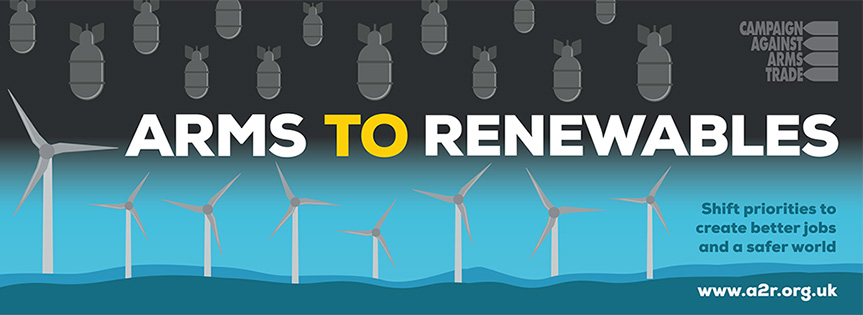As COVID-19 forces sweeping changes on our lives, our Government’s obsession with investing in military security over real human threats has been laid bare. Billions have been poured into aircraft carriers, nuclear weapons and war ships, but our health and social care services were on their knees even before the crisis hit.
Amidst the uncertainty, there is a ray of hope. For years CAAT and others have argued that arms company workers have the vital skills needed to build a new greener economy. Yet the political will needed was not there.
The urgency brought by the pandemic saw these blocks lifted almost overnight. Faced with a shortage of ventilators, many of the biggest arms companies including Thales, BAE and Airbus joined Ventilator Challenge UK, a consortium building ventilation equipment, showing how, with government support, change can happen on the factory floor.
The New Lucas Plan
In the 1970s workers at arms company Lucas Aerospace faced the threat of unemployment caused by new technology and recession. The workers collected 150 ideas for alternative, ‘socially useful’ products they could build. ‘The Lucas Plan’ was born.
Forty years later, in the face of political, economic and environmental crises, ‘The New Lucas Plan’ was launched. It aims to develop plans for a new and democratic economy, based on the Lucas Aerospace workers’ idea of ‘socially useful production.’
Building on these ideas, CAAT, union members, and opposition MPs called for the creation of a Shadow Defence Diversification Department, to pressure the Government to pursue arms conversion. Despite support from the former Shadow Cabinet, it did not feature in Labour’s Manifesto. However, with a potential shift in what feels possible post-COVID-19, all eyes will be on the new Labour leader Keir Starmer.
A properly managed and truly just transition can redress inequalities and help to deliver a high-skill, high-wage, and low-carbon economy for the UK.
Just Recovery
In the 1980s, the trade union movement developed the idea of a ‘just transition’ for workers and their communities. A ‘just’ transition “guarantees better and decent jobs, social protection, more training opportunities and greater job security for all workers”. The need to deliver a ‘just transition’ is even recognised in the UN Paris Agreement on climate change.
While the Government is rightly focussed on responding to the COVID-19 crisis, its response to the equally pressing issue of climate breakdown has been woefully inadequate. Fatih Birol, Head of the International Energy Agency, has called for an acceleration of capital towards the green economy in response to the crisis.“This is a huge opportunity we cannot miss … not only the level of money [dedicated to stimulate the economy] but the direction of the money” [to “climate-proof jobs].”
CAAT has added its voice to the campaign for a Just Recovery from this global crisis, coordinated by climate campaign group 350, ensuring that as we recover, the Government is taking progressive steps forward for people and the planet.
We need strong public services and communities, and well-paid, secure jobs, including new jobs for workers currently employed in fossil fuel and arms companies. When the Government hands out loans, it should prioritise companies who can help the UK to decarbonise quickly and fairly.
The UK must do more than its fair share to tackle climate breakdown, to redress the imbalance of its historic emissions, and its role in the exploitation of resources and communities.
The COVID-19 pandemic has thrown into sharp focus the urgent need for governments to redefine what it means by ‘security’ and to reflect the real threats to human security including global pandemics and climate change.
Our security is not advanced by wars, or by spending billions on nuclear weapons systems and aircraft carriers, but by building fairer societies that support the most vulnerable, and by investing in our public services. Let’s work together to ensure that out of this crisis we build a safer world, where real human needs are prioritised.
Add your name to the call for a Just Recovery at 350.org/just-recovery/
This article was originally published in CAAT News – you can read the whole magazine online here.

